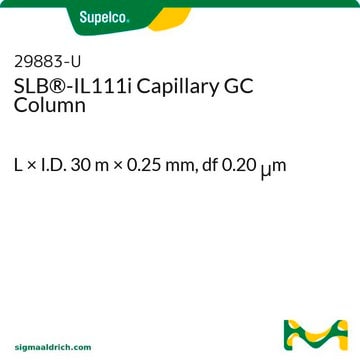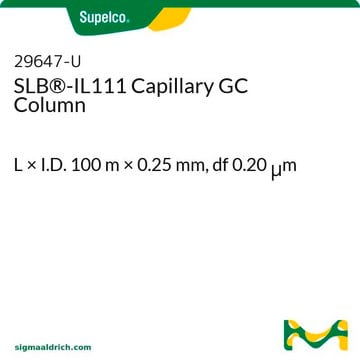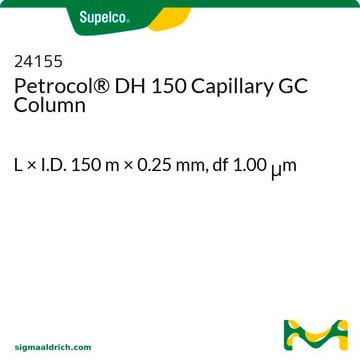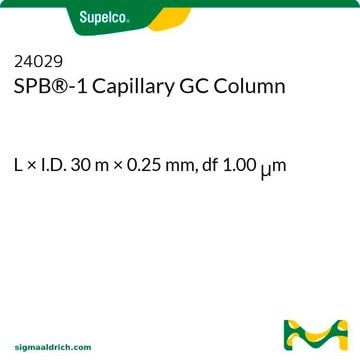29689-U
SLB®-IL111 Capillary GC Column
L × I.D. 200 m × 0.25 mm, df 0.20 μm
About This Item
Productos recomendados
material
fused silica
Quality Level
parameter
50-270 °C temperature (isothermal or programmed)
Beta value
313
df
0.20 μm
technique(s)
gas chromatography (GC): suitable
L × I.D.
200 m × 0.25 mm
matrix active group
Non-bonded; 1,5-Di(2,3-dimethylimidazolium)pentane bis(trifluoromethanesulfonyl)imide phase
application(s)
agriculture
biofuels
chemicals and industrial polymers
clinical
environmental
food and beverages
petroleum
column type
capillary extremely polar
¿Está buscando productos similares? Visita Guía de comparación de productos
General description
USP Code: None
Phase:
- Non-bonded
- 1,5-Di(2,3-dimethylimidazolium)pentane bis(trifluoromethylsulfonyl)imide
- 50 °C to 270 °C (isothermal or programmed)
Application
This study presents a rapid method for analyzing trans fatty acid contents in edible oils using a fast gas chromatography (GC) technique combined with a highly polar ionic liquid column. The method significantly reduces analysis time to under 30 minutes, compared to over 90 minutes required by traditional methods from the American Oil Chemists’ Society (AOCS) and Japanese Oil Chemists’ Society (JOCS). The effectiveness of the fast GC method was confirmed through comparisons of trans fatty acid content in various oils, showing good agreement with results from the official methods. The study highlights the advantages of using m-TFPTAH for methyl esterification, which streamlines the process and enhances throughput.
Shinsuke Inagaki, Masahiko Numata (2015) https://doi.org/10.1007/s10337-014-2837-z
Legal Information
Storage Class
11 - Combustible Solids
wgk_germany
WGK 3
flash_point_f
Not applicable
flash_point_c
Not applicable
Elija entre una de las versiones más recientes:
¿Ya tiene este producto?
Encuentre la documentación para los productos que ha comprado recientemente en la Biblioteca de documentos.
Protocolos
Ionic liquid capillary GC columns enhance polar analyte inertness, addressing challenges in chromatography with improved stationary phases.
Ionic liquid capillary GC columns enhance polar analyte inertness, addressing challenges in chromatography with improved stationary phases.
Ionic liquid capillary GC columns enhance polar analyte inertness, addressing challenges in chromatography with improved stationary phases.
Ionic liquid capillary GC columns enhance polar analyte inertness, addressing challenges in chromatography with improved stationary phases.
Nuestro equipo de científicos tiene experiencia en todas las áreas de investigación: Ciencias de la vida, Ciencia de los materiales, Síntesis química, Cromatografía, Analítica y muchas otras.
Póngase en contacto con el Servicio técnico







